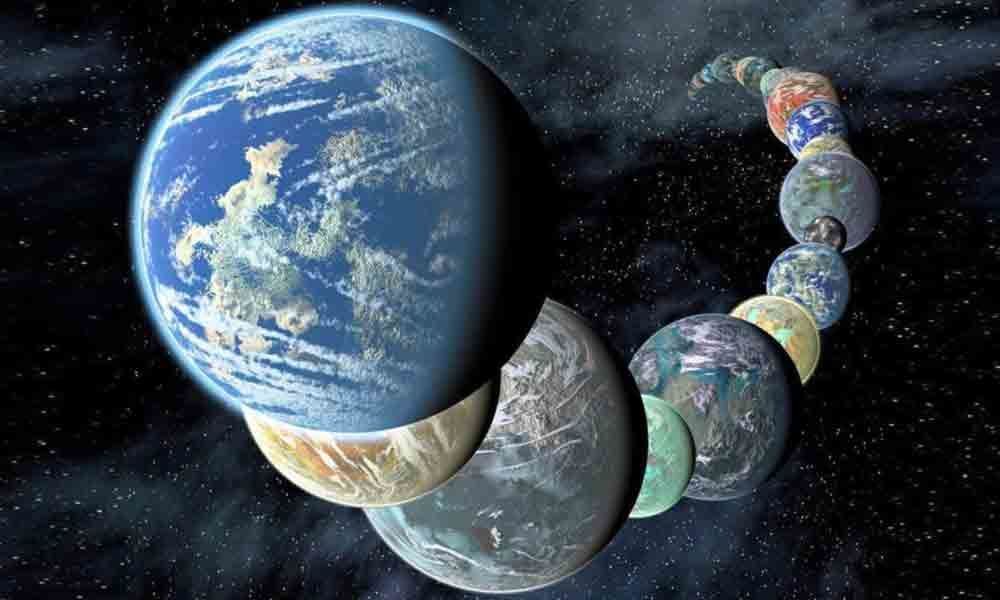Live
- Parenting Tips for parents: Creating a focused study space
- Australia’s warm tradition of family get-together at MCG
- Atal Bihari Vajpayee birth anniversary celebrated
- Junior National Equestrian: Anupati, Raju emerge winners
- Martina clinches silver at Asian Jr Weightlifting Championships
- Bumrah equals Ashwin’s feat in ICC rating points
- Ready to spar on Boxing Day: India fret on Rohit’s batting position
- Head’s show against Bumrah embodies fearless approach
- India exploited Australia’s ‘brittle’ top order, says Shastri
- Top Women-Centric Movies Released In 2024
Just In
Frozen Earth-like planets could support life: Study


Icy planets once thought too cold to support life may have livable land areas, according to a study that challenges the typical assumption of what kinds of planets might be habitable.
Icy planets once thought too cold to support life may have livable land areas, according to a study that challenges the typical assumption of what kinds of planets might be habitable.
Scientists have long thought snowball planets -- Earth-like planets with oceans frozen to the equator -- were hostile to life because of the extreme cold. The study, published in the Journal of Geophysical Research: Planets, found some snowball planets might have areas of land near their equators that reach livable temperatures.
"You have these planets that traditionally you might consider not habitable and this suggests that maybe they can be," said Adiv Paradise, an astronomer and physicist at the University of Toronto in Canada. The habitable zone is a range of distances from a star where a planet could theoretically have liquid water and temperatures warm enough to support life. Planets in the habitable zone can be warm and temperate like Earth, or entirely frozen, like snowball planets. Geologists suspect Earth has gone through anywhere from one to three snowball phases in the past and that marine microorganisms likely survived through at least one of those periods.
"We know that Earth was habitable through its own snowball episodes, because life emerged before our snowball episodes and life remained long past it," said Paradise, lead author of the study. Researchers used a computer programme to simulate different climate variables on theoretical snowball planets, adjusting conditions like the amount of sunlight and configuration of the continents. One variable they were interested in was carbon dioxide, which traps heat and keeps a planet in a temperate climate range. Without it, planets cool and oceans freeze. Planets become snowballs when their atmospheric carbon dioxide levels drop too low from a combination of rainfall and erosion.
Water absorbs carbon dioxide and turns it into carbonic acid, which reacts with rocks on the ground during erosion. This interaction breaks carbonic acid down more. It binds with minerals, which are then carried to the oceans and eventually stored into the seafloor. Scientists previously thought carbon dioxide removal from a planet's atmosphere stopped during snowball phases because all of its surface water was frozen. However, the new study found some snowball planets continue to lose carbon dioxide even after they've frozen. This means the planets would have to have some non-frozen ground and occasional rainfall for water to continue to remove carbon dioxide from the atmosphere. Some of the warmer snowball planets the study's authors simulated had land areas warm enough to hold liquid water and life even when their oceans were frozen to their equators.
They found land areas in the centre of the continents away from the frozen oceans could reach temperatures above 10 degrees Celsius. This is much warmer than the lowest temperature at which life can reproduce, which scientists estimate to be minus 20 degrees Celsius. The results also suggest Earth-like planets can become stuck in a snowball state under certain conditions.

© 2024 Hyderabad Media House Limited/The Hans India. All rights reserved. Powered by hocalwire.com






